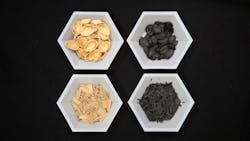Research project to test biochar in wastewater treatment for agricultural reuse
Researchers are leading a project to use plant materials for a low-cost technology to make reclaimed water safer for agricultural reuse, according to a press release from the University of California, Riverside.
Funded by the U.S. Department of Agriculture’s Agriculture and Food Research Initiative, the project will test how effectively biochar made from various types of discarded plant materials can “polish” the water.
On average, agriculture accounts for 70% of global freshwater use. In California, which produces nearly half of all U.S.-grown fruits, nuts, and vegetables, that number rises to 80%.
The United Nations estimates food production will need to double by 2050. However, water supplies will not increase accordingly. Instead, due to climate change and drought, water resources are quickly shrinking.
One solution to the increasing need for farm water is to use treated municipal wastewater. There are roughly 16,000 wastewater treatment plants in the U.S., each of them capable of processing up to 10 million gallons every day.
“It’s a huge amount of processed water that’s mostly clean and can be used again, but there’s a problem,” said Ananda Bhattacharjee, assistant project scientist at the U.S. Department of Agriculture’s Salinity Laboratory, based at UC Riverside.
“This water can contain chemicals of emerging concern, like antibiotics, that are difficult to detect and treat without advanced and expensive instrumentation,” he said. “These instruments also require trained laboratory personnel to operate and maintain.”
Once exposed to the antibiotics in the water supply, soil bacteria immediately start developing resistance to the drugs because they want to survive. “Bacteria are amazing biological sensors,” he said. As the bacteria develop resistance, antibiotics stop working.
Once crops are irrigated with contaminated reclaimed water, plants that get harvested and come to our dinner tables may contain residual antibiotics, resistance genes, and resistant bacteria.
Biochar is a charcoal-like substance made by burning organic material. Burning any organic matter, even wood chips, in limited-oxygen environments retains the mass of the burned substance. The remaining, charred substance is highly absorbent.
Based on this principle, Daniel Ashworth, a soil scientist at the Salinity Laboratory, first built a bench-scale filtration system with biochar for the removal of antibiotics in synthetic wastewater. The results were very promising, with antibiotics removal efficiency of up to 98%.
“Encouraged by Dr. Ashworth’s experiments, we will be designing the larger-scale biochar-based polishing systems for removing residual antibiotics in reclaimed water,” Bhattacharjee said.
Using biochar polishers could potentially remove the need to detect the antibiotics in reclaimed water, assisting treatment plants that do not have advanced detection or treatment technologies, and cannot afford them. Affordability is also one of the best features of the biochar system.
For this project, scientists from UC Riverside, the U.S. Department of Agriculture, U.S. Salinity Laboratory, and the University of California’s Agriculture and Natural Resources are teaming up to test biochar made from multiple kinds of plant materials left over from agricultural field production.
To start, they’ll collect treated sewage sludge and plant materials such as pistachio shells and date palm leaves which would otherwise be thrown away. These materials will be turned into biochar for designing filtration systems that reclaimed water can pass through.
Ultimately, the team would like to develop a database of different, inexpensive biochar materials that can all be used for removing harmful compounds from reclaimed water for agricultural reuse, especially crop irrigation.
If the costs remain low and effectiveness remains high, the research team hopes growers will install biochar-based reclaimed water polishing systems on their farms.
“That is the major goal of the project, taking this from bench scale to full field scale,” Bhattacharjee said.
